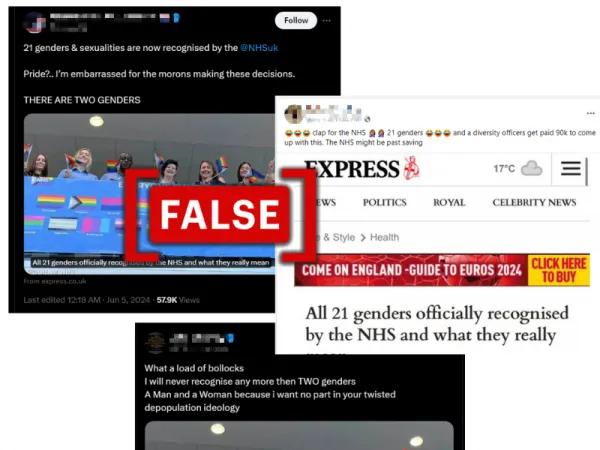By: Siri Christiansen
June 11 2024
 Screenshots of social media posts. Source: X/Facebook/Screenshots (Modified by Logically Facts)
Screenshots of social media posts. Source: X/Facebook/Screenshots (Modified by Logically Facts)
The 21 Pride flags in the NHS banner represent different identities in the LGBTQ+ community, not genders.
Context
Viral social media posts falsely claim that the U.K. public health service, the NHS, has officially recognized 21 genders for Pride Month 2024.
This is based on a June 3 Daily Express article headlined "All 21 genders officially recognized by the NHS and what they really mean."
"I'm sick to death of paying taxes for a bunch of ideological gender cultists to pander to a bunch of deranged narcissists," one X user said in response to the article.
Screenshots of social media reactions to the Daily Express article (archived here, here, and). Source: X/Facebook/Screenshots (Modified by Logically Facts)
The outrage comes amid a national general election campaign where gender identity has been front and center. Days earlier, the Conservatives announced plans to rewrite the definition of sex in the Equality Act to enable organizations to exclude transgender people from single-sex spaces such as women's prisons, hospital wards, and sports events – even if they hold a gender recognition certificate.
However, the screenshot of the headline has been shared without context, and the banner in the original post represents different identities in the LGTBQ+ community and not 21 different genders.
In fact
The Daily Express article refers to an LGBTQ+ banner at the Royal Stoke Hospital in the North Midlands. The banner features 21 Pride flags, and the University Hospitals of North Midlands explained in an X post that the flags represent "that everyone is welcome here at UHNM."
While the Rainbow Pride flag is the most well-known, several additional Pride flags have been designed over the decades to represent specific communities within the overarching LGBTQ+ spectrum. Plenty of guides are available online to explain what each flag represents — here's one of them:
In other words, the Pride flags do not each represent "one gender" – but, rather, a broad spectrum of sexual and romantic orientations, gender identities, and gender expressions within the LBGTQ+ community. The Rainbow and Progress Pride flags, for example, are so-called umbrella flags that aim to represent the intersection of these different groups. Other flags – such as the Lesbian, Gay Men, Bisexual, Pansexual, Asexual, Demisexual, Polyamory, and Polysexual Pride flags – aim to represent specific sexual orientations.
Only seven of the 21 flags refer specifically to gender identity and expression: the Transgender, Non-Binary, Intersex, Genderfluid, Genderqueer, Agender, and Neutrois Pride flags. It should be noted that genderqueer and non-binary are umbrella terms of gender identities that fall outside of the male-female gender binary, and some use them interchangeably.
The NHS collects data about patients' gender identity, including trans and non-binary identities, to provide more personalized care, avoid cisnormativity, and promote LGBTQ+ inclusive practice. This, however, is not the same as "officially recognizing" 21 different genders. According to the U.K. government website, non-binary genders are not legally recognized in Britain, and those applying to change their legal gender can only apply to be recognized as male or female.
The verdict
A local NHS hospital has displayed an LGBTQ+ banner with 21 different Pride flags. These flags represent a variety of sexual or romantic orientations, gender identities, gender expressions, and LBGTQ+ communities – not 21 different genders. Therefore, we have rated this claim as false.